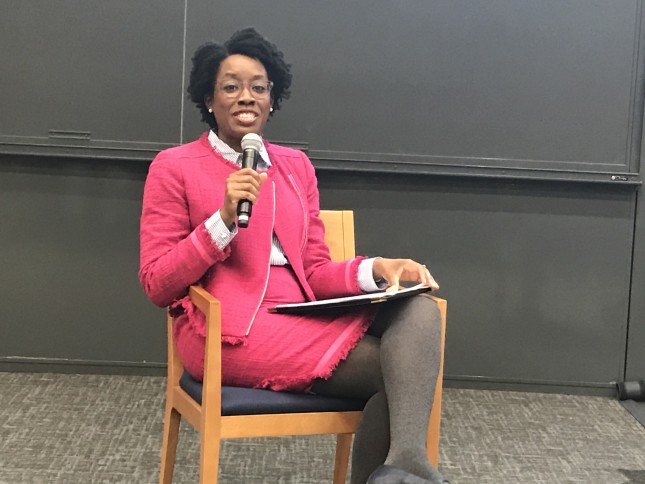-
U.S. Representative Lauren Underwood on U.S. Maternal Health and Policy Solutions
January 22, 2020 By Deekshita Ramanarayanan
“This is a unique moment—a crisis that has demanded action for decades and is now getting the attention it deserves,” said U.S. Representative Lauren Underwood (D-IL-14) at a recent event on maternal health and disparities hosted at George Washington University’s Milken Institute School of Public Health. The United States has the highest maternal mortality rate among high-income countries and for every maternal death, there are 70 “near-misses.” It is important to take a “life-course” approach to address this issue from a policy perspective, said Underwood.
The Black Maternal Health Caucus and the Congressional Maternity Care Caucus are advocating for a “Momnibus” bill package, a first-ever package of legislation, scheduled to be introduced this year, that aims at improving maternal health and quality of care. The “Momnibus” legislation package addresses social determinants of health, the perinatal workforce, insurance coverage for women in the postpartum period, data on maternal mortality, and maternal mental health.
A third of maternal deaths occur in the postpartum period of six to twelve weeks following childbirth. Included in the “Momnibus” package, The Helping MOMS Act proposes federal funding to expand Medicaid coverage for one year postpartum. Currently, Medicaid coverage is available for pregnant women for only two months postpartum in states that have not expanded Medicaid access and coverage. Maternal Mortality Review Committees, which collect data on maternal deaths to determine their underlying causes, and other maternal health advocates also recommend expanding insurance coverage to a full year postpartum to ensure that postpartum care is accessible for all women in the U.S.
The “Momnibus” package will also include the Perinatal Workforce Act to allow Medicare and Medicaid coverage for healthcare providers other than medical doctors participating in the maternal health team, such as midwives and doulas. Midwifery care is as safe as, or safer than, physician provided care, said Darla Bishop, a Doctor of Public Health (DrPH) candidate at the Milken Institute School of Public Health.

Mental health disorders can greatly impact maternal health. Mood or anxiety disorders impact 10 percent of all pregnant women and 13 percent of women postpartum. Underwood’s proposed Moms Matter Act and the Maternal Mental Health Interagency Task Force call for investments to integrate mental health care with maternal health. By developing innovative care models, these policies can increase support for women experiencing mental health disorders, such as postpartum depression.
Advocates behind the “Momnibus” package, like Mom Congress, hope to address racial disparities in maternal health. Medicaid covers over half of pregnancies among black women in the United States. Expanding options for maternal health care providers and increased insurance coverage can combat racial disparities in maternal mortality and morbidity, said Underwood. As the maternal health crisis disproportionately impacts black women, it is important to “center black women in all the work we do,” she said. “We are at an inflection point in our nation on black maternal health and women’s health progress,” said Underwood. “There is a real sense of urgency about this work.”
Sources: 2020 Mom, Mom Congress, U.S. Congress
Photo Credit: Lead photo via Shutterstock. All rights reserved.
 A Publication of the Stimson Center.
A Publication of the Stimson Center.




